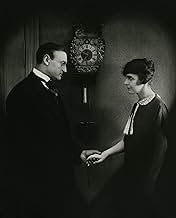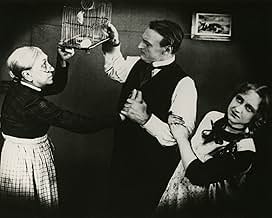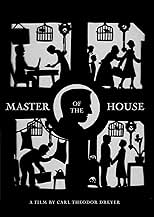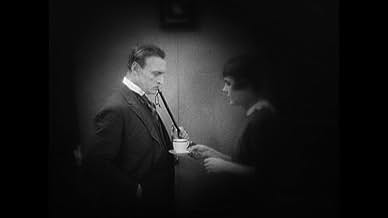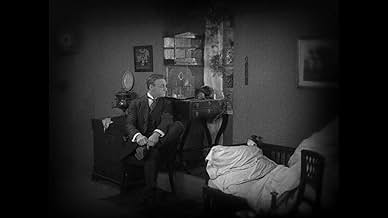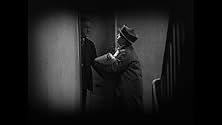IMDb रेटिंग
7.0/10
2.6 हज़ार
आपकी रेटिंग
अपनी भाषा में प्लॉट जोड़ेंWhen a man becomes tyrannical towards his family, the women of the house decide to teach him a lesson in gratitude.When a man becomes tyrannical towards his family, the women of the house decide to teach him a lesson in gratitude.When a man becomes tyrannical towards his family, the women of the house decide to teach him a lesson in gratitude.
फ़ीचर्ड समीक्षाएं
...that explores the deterioration of a relationship of a husband and wife in Denmark after the man has lost his business. He becomes, not only morose, but extremely nasty towards his entire family, channeling all of his own personal misery towards his wife, his mother-in-law, his children, and his former nanny.
The first half of this film will win few viewers' sympathy concerning the husband. Frankly, in most of today's world, especially in the USA, any wife would have walked long ago rather than put up with such abuse. Instead, we see a form of mores that existed in a culture of yesterday, where this particular wife still holds great affection for her husband. Carl Theodore Dreyer does a commendable job showing the breakdown of the situation into its component parts, the breakup of the relationship, not by the wife, but by the nanny and mother-in-law, and then the re-assembling of the pieces into a concordant whole again. It's beautifully done, but it's dated. The major star of the piece is Mathilde Nielsen who plays the former nanny of the husband. Her eyes alone are worth the show.
This is well worth the watch but be forewarned that this is not necessarily a very pleasant piece, and I found as much to frown as to smile about.
The first half of this film will win few viewers' sympathy concerning the husband. Frankly, in most of today's world, especially in the USA, any wife would have walked long ago rather than put up with such abuse. Instead, we see a form of mores that existed in a culture of yesterday, where this particular wife still holds great affection for her husband. Carl Theodore Dreyer does a commendable job showing the breakdown of the situation into its component parts, the breakup of the relationship, not by the wife, but by the nanny and mother-in-law, and then the re-assembling of the pieces into a concordant whole again. It's beautifully done, but it's dated. The major star of the piece is Mathilde Nielsen who plays the former nanny of the husband. Her eyes alone are worth the show.
This is well worth the watch but be forewarned that this is not necessarily a very pleasant piece, and I found as much to frown as to smile about.
The story of a "spoilt husband" - selfish, irritable, very ill-tempered and demanding as he rules the house, while his patient/devoted wife gets up at the crack of dawn to start her drab day of tending to his constant needs and complaints. Even the kids have to perform tasks all day rather than play to satisfy their tyrant of a father - but he's NEVER satisfied, nothing seems to be to his liking! Yeah, you got it, this guy is a serious jerk leaving me to wonder why the wife hasn't left him long ago. Luckily smart Nana, hubby's childhood nursemaid, steps up to the plate to help make some changes as she fetches the wife's mother and the two old women set out to straighten this guy out and teach him the lesson he so badly needs - to appreciate his wife. So the wife goes away for a "rest" (well needed, I should say) leaving hard-nosed Nana in charge of the brute!
This film is adequately entertaining, it is photographed in an interesting way, but is somewhat slow-moving and drags a bit in places. I would say at least half an hour shorter would have made this a better film. The acting is quite well done by all players. The version as shown on TCM included a pleasant piano score that sometimes suits the plot - and sometimes doesn't. Worth seeing.
This film is adequately entertaining, it is photographed in an interesting way, but is somewhat slow-moving and drags a bit in places. I would say at least half an hour shorter would have made this a better film. The acting is quite well done by all players. The version as shown on TCM included a pleasant piano score that sometimes suits the plot - and sometimes doesn't. Worth seeing.
The thing that struck me most about this film is how progressive it is though maybe not by today's standards. In a modern film Ida would be setting out for a divorce and establishing herself into a career and provided for her own but this is a film that revolves around a man learning to appreciate the work that his wife does and even coming to realize that while he earns the money, she has the harder job.
With the many different faces that the feminist movement has taken over the years this early step of correcting a man who has taken his wife for granted was especially meaningful for me. I'm not a business owner so it feels like there are many things that are out of my control to help women. I can't raise their wages or give them healthcare they need or even, as a poor person, help them get out of bad living situations.
What I can do, and is easier to forget than I would like to admit, is be gracious and kind, thankful that my wife is who she is and works as hard as she does.
As our culture has turned itself on its head with such an extreme form of Capitalism, it is easy to forget that the main function of a home is not to give wage earners a place to eat and sleep till they go back out into the world but rather, the other way around. The wage earner leaves the home to provide money so that the family, the home, can be a place people want to spend time and company within.
In this film, Viktor has it upside down and the women in his life see it. When he does not respond to verbal cues, they give him a last chance to learn, though it will be a hard lesson to swallow. In many ways this is a profoundly feminist film. The lead male is the only character who is seen as ignorant of his actions effects and he is the only one so stubborn as to believe that he is always in the right.
With the many different faces that the feminist movement has taken over the years this early step of correcting a man who has taken his wife for granted was especially meaningful for me. I'm not a business owner so it feels like there are many things that are out of my control to help women. I can't raise their wages or give them healthcare they need or even, as a poor person, help them get out of bad living situations.
What I can do, and is easier to forget than I would like to admit, is be gracious and kind, thankful that my wife is who she is and works as hard as she does.
As our culture has turned itself on its head with such an extreme form of Capitalism, it is easy to forget that the main function of a home is not to give wage earners a place to eat and sleep till they go back out into the world but rather, the other way around. The wage earner leaves the home to provide money so that the family, the home, can be a place people want to spend time and company within.
In this film, Viktor has it upside down and the women in his life see it. When he does not respond to verbal cues, they give him a last chance to learn, though it will be a hard lesson to swallow. In many ways this is a profoundly feminist film. The lead male is the only character who is seen as ignorant of his actions effects and he is the only one so stubborn as to believe that he is always in the right.
Victor Frandsen is a domestic tyrant. His wife Ida has to work as a slave for him and the rest of the family. She rises early to prepare everything for the day, she toils all day long, and she is often up also in the night, doing some sewing to earn extra money for the household.
Dreyer is one of the greats in silent cinema, both in his homeland and internationally. His greatest achievement is probably "Joan of Arc" and many have appreciated "Vampyr". This film came a few years earlier, but is every bit as good in its own way (and with its release on Criterion, it has never looked better).
The Danes are not typically known for their role in cinema history, but Dreyer was an undeniable force in the 1920s If nothing else, he inspired Bergman, who was probably the greatest Scandinavian director of all time.
Dreyer is one of the greats in silent cinema, both in his homeland and internationally. His greatest achievement is probably "Joan of Arc" and many have appreciated "Vampyr". This film came a few years earlier, but is every bit as good in its own way (and with its release on Criterion, it has never looked better).
The Danes are not typically known for their role in cinema history, but Dreyer was an undeniable force in the 1920s If nothing else, he inspired Bergman, who was probably the greatest Scandinavian director of all time.
"We men are such fools!" proclaims former master of the house Viktor, and you can't help but feel a sliver of guilt as he silently utters those words. That's the timeless universality of film, I suppose: a Danish movie made over 80 years ago is still relevant today.
This was my first Dreyer, and it is quite a light offering considering the man's weighty reputation. It's a social drama with a patently feminist message delivered with a typically heavy hand (by today's standards). Johannes Meyer is Viktor, the decent man turned into a brute by the failure of his business who doesn't realise just how much he takes his long-suffering wife Ida (Astrid Holm) for granted. Fortunately for Ida, Viktor's curmudgeonly former nanny (Mathilde Neilsen), takes control of the situation by packing the frazzled Ida off to a sanatorium so that she can sort Viktor out.
The film drags for the first half-hour as the daily ritual of the Frandsen family is established. Let's face it, there's little of interest in watching people polishing shoes and preparing breakfast, but things get a little more interesting once Nanny takes charge. It's message is a bit too sweeping (although all us men are probably guilty to some degree) and a little too simplistic in its treatment and resolution, but there's plenty on the screen to demonstrate Dreyer's talent as a director - although some symbolism (caged birds, for example) must have been overused even by 1925. A decent enough film, worth watching despite its mundane setting.
This was my first Dreyer, and it is quite a light offering considering the man's weighty reputation. It's a social drama with a patently feminist message delivered with a typically heavy hand (by today's standards). Johannes Meyer is Viktor, the decent man turned into a brute by the failure of his business who doesn't realise just how much he takes his long-suffering wife Ida (Astrid Holm) for granted. Fortunately for Ida, Viktor's curmudgeonly former nanny (Mathilde Neilsen), takes control of the situation by packing the frazzled Ida off to a sanatorium so that she can sort Viktor out.
The film drags for the first half-hour as the daily ritual of the Frandsen family is established. Let's face it, there's little of interest in watching people polishing shoes and preparing breakfast, but things get a little more interesting once Nanny takes charge. It's message is a bit too sweeping (although all us men are probably guilty to some degree) and a little too simplistic in its treatment and resolution, but there's plenty on the screen to demonstrate Dreyer's talent as a director - although some symbolism (caged birds, for example) must have been overused even by 1925. A decent enough film, worth watching despite its mundane setting.
क्या आपको पता है
- ट्रिवियाAt its original release in Paris, France, this film played in 57 theaters in three weeks.
- भाव
Opening Title Card: In the numerous streets of the Big City, house follows house, and in those houses, people live in layers - like wild birds carving their nests into the rock... nest above nest...
- इसके अलावा अन्य वर्जनA 107-minute version with English intertitles and an uncredited piano score was shown on the Turner Classic Movies (TCM) channel in 2006. It had no crew credits other than the director (as Carl Dreyer) and only three cast members: Johannes Meyer (as Johs Meyer), 'Astrid Holm' and Mathilde Nielsen. The English names used were John and Mary for the husband and wife, presumably to indicate a typical family, and "Nana" for the Wetnurse. The two older children were called Kathleen and Dick.
- कनेक्शनEdited into Mathilde Nielsen - Kavalkade (1941)
टॉप पसंद
रेटिंग देने के लिए साइन-इन करें और वैयक्तिकृत सुझावों के लिए वॉचलिस्ट करें
- How long is Master of the House?Alexa द्वारा संचालित
विवरण
- रिलीज़ की तारीख़
- कंट्री ऑफ़ ओरिजिन
- भाषा
- इस रूप में भी जाना जाता है
- Master of the House
- उत्पादन कंपनी
- IMDbPro पर और कंपनी क्रेडिट देखें
- चलने की अवधि
- 1 घं 51 मि(111 min)
- ध्वनि मिश्रण
- पक्ष अनुपात
- 1.33 : 1
इस पेज में योगदान दें
किसी बदलाव का सुझाव दें या अनुपलब्ध कॉन्टेंट जोड़ें

